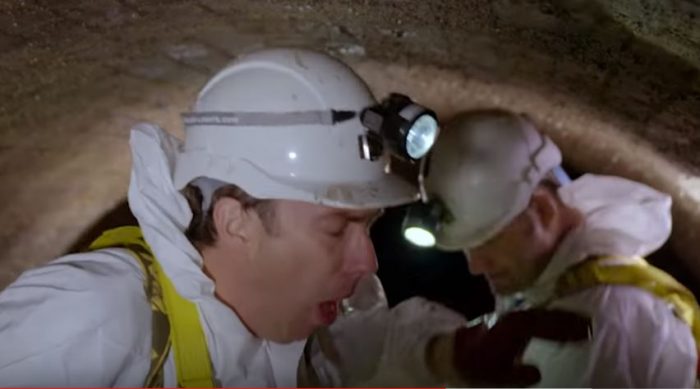There’s plenty to love about wet wipes.
The carry-in-your-bag, ultra-convenient, tossable washcloths can make the removal of makeup and dirty mess (baby or otherwise) a pretty simple affair. Or, so you think.
Well, the bit about cleaning is true (or is it?). But, the over-reliance on wet wipes for cleanliness has left us with a far dirtier problem.
“Fatbergs,” or giant (double-decker sized) mounds of fat-wrapped wet wipes, are breaking sewers and flooding that just-washed grubbiness right back onto the streets and into our homes.
Don’t believe me? Take a look at what happened to this sewer in London four years ago. And in 2018, across the other side of the pond in Charleston, South Carolina, when divers were sent down 90 feet into the sewage well to handle a blockage, this is what they found.
Yep, pretty gross. And this is going on worldwide.
In an effort to avoid wipes being flushed down the toilet, earlier this year the Australian Competition and Consumer Commission, backed up by Sydney Water, fought (and lost) Kleenex over having “flushable” taken off the packaging of their wet wipes.
You see, it turns out that “flushable,” “disposable,” or “biodegradable” wet wipes are, in truth, pretty darn hard to get rid of. They can’t break down like regular toilet paper and when mixed with grease and cooking oils (also sent down our sewers), wet wipes form into fatty lumps.
In Sydney, the fatberg problem costs their water provider $8m per annum and with an estimated 400,000 blockages a year in the U.K. (the largest in the world), wet wipes wreak havoc on the flow of our toilets which, in turn, drives up the cost of water bills (not so convenient now, eh?).
And, if that hidden cost wasn’t enough of a kicker, if wet wipes continue to be flushed down the loo, then at some point you’re likely to pay through the nose (pun intended) for a plumber or drain clearance company to come and unblock the smelly mess in your home.
On the day of writing this, I had to pay £145 for a specialist drain unblocker to flush out the stinking wad of wet wipes clogging up the household drain that we share with our neighbour (average cost for this type of problem is between £66-200).
A problem we may not have had if our neighbour knew about soap.
Soap. Remember that? The hold in your hand, lather-up and rinse friend of the drain. It comes in many beautiful shapes and sizes, and when made from natural ingredients can smell divine too! But most importantly “bounteous handmade soaps don’t cost the earth”—well said, Lush!
You see, it’s not just your drains (and bank balances) that suffer the damaging effects of wet wipes. Millions of these indestructible cloths find their way into the ocean, where they’re mistaken for food by Disney fish-favourites Dory, Nemo, and Crush the turtle who then eventually die of starvation, filled to bursting with microfibers of plastic found in the wet wipes—not quite the Disney ending we’re used to, right?
Now, forgetting for a minute that death-by-wet-wipe is not an acceptable way for marine life to go, worse still is that the ingested plastic ends up in the food chain, which we, in turn, eat—yum!
I’m not a fan of plastic-filled food, nor am I a fan of seeing beaches littered with used wet wipes—an all too regular occurrence, with a 400 percent rise in the last decade.
So next time you reach for the wet wipes, consider whether your dirty habit is really keeping your hands (and conscience) clean. If the answer is no, then do us all a favour and reach for the soap instead.
Alternatively, just wait for the fatbergs to surface and reuse the fat to make your own soap! Any takers? Nah, I thought not.
~
Also see this DIY version of reusable wet wipes:












Read 10 comments and reply